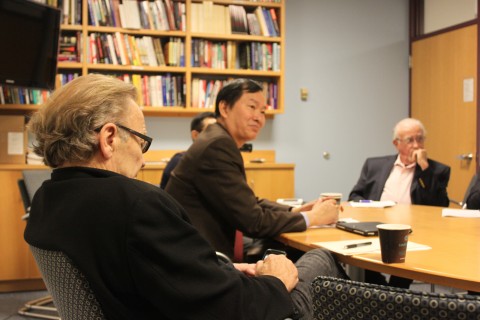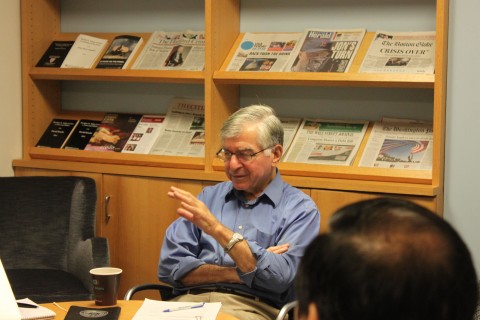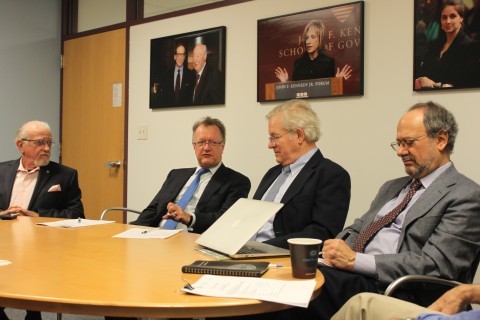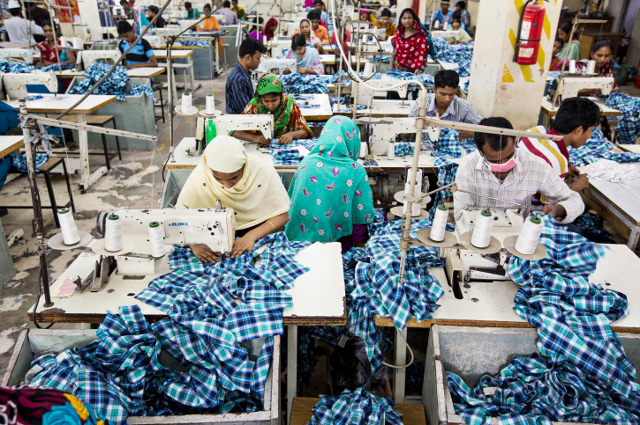
November 18th Online Conference Summary & Notes
In order to push forward with our discussion on Improving Minimal Global Standards for Worker Safety, Philip Hamilton, a BGF correspondent, summarized the major points on Nov 18th.
Full transcript can be found Here.
 Jeff Krilla, Alliance for Bangladesh Worker Safety
Jeff Krilla, Alliance for Bangladesh Worker Safety
- “Shared suppliers make up approximately 50% of the Alliance factory list, underscoring the need for combined efforts on the behalf of factory workers.”
- Alliance’s goal is to advance a set of common/shared standards that will result in making all Bangladeshi factories safer.
- Alliance is aiming to create an anonymous worker hotline in order to facilitate worker empowerment so workers can raise safety concerns confidentially and anonymously.
- Safety committees, worker participation committees, and unions will give workers a sufficient voice to communicate effectively with management. The Alliance will also encourage management to engage with workers and to allow the right to organize so there can be open and regular dialogues on safety.
- Emphasis on worker empowerment.
- Emphasis on collaboration amongst all stakeholders. Government and civil society partnerships with the Alliance will be especially important to the success in improving safety standards.
- Prof. Quelch Question: Would coordination between the Accord and Alliance be beneficial? What, if anything, can the Alliance do at subcontractor plants to improve safety?
- Krilla hopes that the Alliance and Accord will harmonize their efforts as much as possible. Recent events have shown that they can align their two standards, which is critical. Cooperation between the two on the ground in Bangladesh has been significant.
- Alliance members are committed to ensuring that illegal subcontracting doesn’t occur.
- Enforcing company rules and regulations, and efforts to amplify the Alliance’s efforts will help to stamp out illegal subcontracting.
- Question: Where does the spark come from in factory fires? Is it electrical outputs that produce the spark or something else? Do safety strategies exist for workers in garment factories?
- Fire safety, electrical safety, and structural safety are integral to worker safety.
- Electrical safety is a major issues causing fires in garment factories. Many electrical systems are antiquated and garments easily catch fire. Thus worker training on safety issues is crucial so that fire hazards can be minimized.
- The Alliance, like the Accord, does not address reparations. The Alliance aims to prevent future Rana Plaza disasters and hopes that by taking aggressive preventative action there will be no need for reparations.
- The Alliance is committed to using low-interest loans
- Following the Rana collapse the ILO has really taken on the issue of structural change in worker safety.
- The giant statement issued on May 4th, the National Tripartite Agreement, and the Sustainability Compact are the three main framework agreements that seek to improve fire safety, electrical safety, and labor rights in the garment structure. These are supplemented by the Alliance and Accord.
- From the ILO’s point of view, weak labor enforcement capacity, irregularities in safety and building licensing, absence of workers organizations, are crucial gaps that must be addressed.
- ILO launched a program with 5 priorities focusing improving building inspections, fire and electrical safety of all the factories not covered by the Alliance or Accord.
- 3,500 factories are active in Bangladesh, 2,000 are covered by the Alliance and Accord, 1,500 remaining factories are covered by the ILO program.
- ILO is focusing on strengthening the labor inspection system and enforcing labor legislation.
- There is a lack of adequate priority for creating an occupational safety and health culture.
- Coordination is a major challenge and harmonization is a major issue that must be addressed.
- Prof. Quelch Question: What is the mood among factory owners regarding their willingness to cooperate with these various efforts by the Accord and Alliance?
- Factory owners has realized that unless these issues are addressed in terms of improving safety and promoting labor rights in Bangladesh then the industry may land in crisis.
- We see a shift in the attitudes of employers in Bangladeshi factories.
- Prof. Quelch Question: You don’t think they’re just biding their time and hoping this is going to go away? The ones you have talked to are committed to making a change?
- There are a lot of apprehensions regarding these inspections. What will happen regarding factories that must be closed?
- The Rana Plaza disaster has created unprecedented commitments from the international community. Also a lot of people are watching so there are not a lot of options in terms of whether or not to improve worker safety and labor rights in the garment industry
 Scott Nova, Worker Rights Consortium
Scott Nova, Worker Rights Consortium
- In order to avoid repeating the mistakes of the past we need to better understand the nature of those mistakes.
- It’s vital to bear in mind that brands and retailers have been carrying out inspections regarding worker safety in Bangladesh for more than a decade, yet these inspections have failed to protect worker safety.
- It’s important to bear in mind that in virtually every factory where workers have died in mass in fires and building collapses, those factories have been inspected under industry and factory inspection programs, so we need to understand why those past programs have not worked.
- Reasons past programs have not worked: they were not independent (they were run by the brands themselves), the results were not publicly available, also brands were not obligated to provide the necessary financial support to provide safe operations, a lack of worker of involvement/the inability of workers to act collectively to protect their own safety, and commitments made by brands regarding worker safety were purely voluntary.
- To protect worker safety going forward, we need programs that address the aforementioned gaps, which is what the Accord is designed to do.
- There will be fully transparent inspections and results, brands will provide substantial support to factories for renovations and safety improvements, there will be a central role for workers including a right of workers to refuse to enter or stay in a building they have a reason to believe is unsafe, and all these commitments by brands are binding/no longer voluntary.
- There are 1,600 factories covered by the Accord; 110 companies are members.
- Prof. Quelch Questions: Can you comment on the implementation challenges and how you are dealing with those? Is coordination and collaboration between the Alliance, Accord, and the ILO something that will prove beneficial? When the Alliance or Accord approach a factory owner with findings that are critical of the workplace, what leverage will the Alliance or the Accord be able to use to enable compliance to occur as opposed to the factory owner dismissing inspection results?
- Financial leverage will be used by the Accord and Alliance in order to ensure compliance by factor owners. If factory owners refuse to make safety improvements then brands and retailers will leave that factory.
- The problem in Bangladeshi garment factories took 20 years to create so it will not be solved in 20 weeks.
- The Accord is open to collaboration and cooperation on a the development of a common inspection standard. However, there are different levels of commitment between the Alliance and Accord signatories which limit the ability of Accord signatories to cooperate with the Alliance.
- The Alliance signatories have not made binding commitments whereas the Accord signatories have. Thus, there is a potential free-rider problem since Accord signatories have made binding financial commitments while Alliance signatories have not. Thus, the Accord signatories could end up footing the entire bill for safety improvements while the Alliance signatories “piggy-back on financial commitments made by the Accord.
- Prof. Quelch Question: What about victim compensation when there are tragedies? We are not sure if the Alliance or Accord agreements actually provide for that.
- The Accord does not contain obligations specific to families or injured workers, not because the Accord does not think that such compensation is not appropriate or necessary, but it’s not within the scope of the Accord. The goal of the Accord is to avoid tragedies that would then give rise to a need for compensation. However, if workers are injured in the future the members of the Accord would certainly urge brand or retailers to pay appropriate and generous compensation to families and injured workers.
- Focused on the common ground, rather than the differences, between the Alliance and Accord.
- Many members of the Accord and Alliance have begun inspections for fire safety and structural safety already using outside engineering firms and fire experts.
- 500+ factories have been inspected by the Accord using outside firms so far and a large number of factories have been inspected by the Alliance.
- The first few months of the Alliance and Accord have created confusion amongst factory owners regarding what the standards would look like, whether there would be multiple sets of standards.
- What we are seeing is that factory ownership in general is really beginning to understand that the members of the Alliance and Accord are extremely dedicated to safety improvements in factories. As such, owners have become relatively cooperative (generally speaking).
- Subcontracting in itself is not necessarily something that can’t be done with transparency. The issue that retailers and brands are getting involved in is unauthorized subcontracting without the knowledge of the buyer or the participants in the supply-chain.
- Export licensing will be suspended if it is discovered that unauthorized subcontracting is occurring.
- Solving the problem of unauthorized subcontracting is a long-term process.
- Prof. Quelch Question: Do you think three years from now worker safety standards will have improved to a new baseline in Bangladesh?
- There is no doubt that three years from now the baseline will have been raised in Bangladesh. Maybe a new industry standard will be set.
- The country has to remain commercially viable. The industry needs to remain competitive. While there is a financial impact of the improvements being made, these changes are just good business and that Bangladesh will remain viable and competitive.
- The numbers indicated going into 2014 that total Bangladeshi exports are improving partly due to a firm commitment by the members of the Accord and Alliance to stay in Bangladesh and to make improvements in worker safety/to resolve these issues.
 Gerben De Jong, Ambassador of the Kingdom of the Netherlands in Dhaka
Gerben De Jong, Ambassador of the Kingdom of the Netherlands in Dhaka
- Two crucial issues to be addressed: 1) a common standard in fire and building safety and inspection; 2) minimum wage.
- I think it will be impossible to explain to factory owners and consumers in Europe and US and rest of world if there was not one common standard for worker safety in Bangladesh.
- Increasing the minimum wage is necessary.
- De Jong believes that the minimum wages will be increased.
- Everything is in place to go onto the next stage, which is carrying out the inspections.
- There is a group working on reparations, and the ILO is facilitating this. A draft document will be signed soon, if all goes according to plan.
- Aiming to build an international fund for reparations.
- There is an opportunity for collaboration.
- The role of the worker and the role of the government have not truly been addressed yet in this discussion.
- Sustainable, long-term improvement cannot rely solely on the good leadership of corporate partners; it needs to be a true partnership to change the way business is done in the sense that it endangers the workers and the workers can’t make a living.
 Sander Levin, Michigan Congressman
Sander Levin, Michigan Congressman
- There is a historic opportunity for all parties to join together and collaborate.
- It’s uncertain if workers will get a living wage.
- Workers need representation; they did not want to go into the Rana Plaza complex. They were told to go in or they’d lose their wages.
- If workers are not represented, will there be adequate attention to safety in the 6,500 factories in Bangladesh and whether they’ll be able to make a living wage.
- Until workers had unions and voice in the workplace in the US, workers had to suffer in unsafe work places/conditions and didn’t make a living wage.
- Some have been working to build labor standards into trade agreements made by the United States.
- Worker participation committees may give workers more voice in the workplace but will likely stand in the way of efforts to develop unions.
- Conditions will improve a bit, but wages will not increase, until workers are giving a voice in the workplace. More attention needs to be paid to giving workers a voice in the workplace.
- Bangladesh can compete while paying a living wage.
- Workers need to participate in these discussions.
 Richard Miller, Committee on Education & the Workforce
Richard Miller, Committee on Education & the Workforce
- Using government procurement policy to raise standards is a worthwhile endeavor.
- The distinction between the Accord and Alliance should not be blurred because the Accord will establish a different model of responsibility going forward since it is equally governed by unions and by brands and retailers.
- The Generalized System of Preferences is a limited tool we can use to send a clear signal to the Bangladeshi government that their labor law reforms have further to go. The reforms undertaken this summer were very limited.
 Bruce Levine, Office of International Labor Affairs, U.S Department of State
Bruce Levine, Office of International Labor Affairs, U.S Department of State
- The State Department is providing financial and technical assistance, and give a push to these efforts to improve worker safety.
- Financial assistance has come through programs that support organization training and technical advice to independent labor unions.
- The State Department supports, through the ILO, efforts for the government to increase their capacity to enforce their labor laws.
- The State Department is coordinating with the Labor Department.
- The future of the industry is at stake.
- It is the fundamental responsibility of the Bangladeshi Government to ensure that the industry is adequately governed so that it does not become the bottom of the race to the bottom.
- We only have relatively limited tools at our disposal. It was only after the recent tragedy that there has been traction on worker safety issues even though the State Department had been pushing the Bangladeshi Government for years.
- There is reason to be optimist that we will make progress.
 Sara Hossain, Bangladesh Legal Aid and Services Trust
Sara Hossain, Bangladesh Legal Aid and Services Trust
- There is a gap between what is happening on the international level and how that is being communicated to workers on the ground.
- There are women workers who have been injured that have been thrown out of their homes because they are no longer able to learn a livelihood and are thus facing destitution. Aside from some small payments they have not been given any reparations.
- What about the brave rescuers who are suffering from PTSD yet are receiving no attention or assistance?
- Any responses that come with simply wielding a stick without considering the conditions on the ground will not be helpful.
- We need to put Bangladeshi workers front and center.
Liana Foxvog, International Labor Rights Forum
- Are Alliance members providing direct financial assistance to factories for safety improvements?
 Joanne Goldstein, Executive Office of Labor and Workforce Development
Joanne Goldstein, Executive Office of Labor and Workforce Development
- One thing that has not been mentioned is the use of states to address how garments and other materials are made in state procurement contracts.
- In Massachusetts we expect their supply-chains to be in compliance if a company wants to do business here.
- States may have less leverage than the federal government but can have an impact.
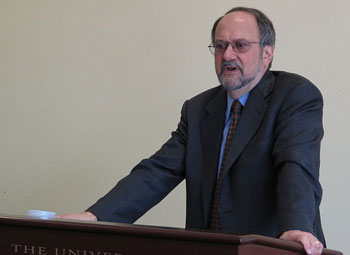 Bob Kuttner, American Prospect
Bob Kuttner, American Prospect
- Worker safety and health concerns have to lead to greater worker rights.
- The obstacles to success are small margins, pressures on intermediaries to keep prices lows, competitive pressures between developing countries for market share.
- We want better safety while maintain low prices.
- We are hoping to move beyond the mere public relations and damage control measures.
- Consumer pressure by itself is not the be-all-end-all because most consumers do not take factory safety/conditions into account; concerns for reputational damage created real leverage.
- Enforceable funding commitments, brands having binding commitments, and worker rights will be absolutely critical.
 Carol Pier, U.S. Department of Labor
Carol Pier, U.S. Department of Labor
- Workers ability to organize and act collectively are key.
- The Department of Labor has just awarded a 2.5 million dollar grant for capacity building, part to the ILO and part to the Solidarity Center.




